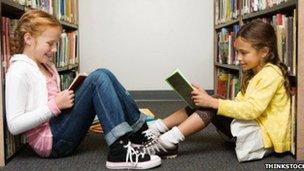'Pushy parents' help children make the grade at school
- Published

Parents who push their children to work hard at school have a bigger impact on their child's academic success than their teachers, research suggests.
The effort a parent puts into ensuring their child buckles down to schoolwork has a greater impact than that put in by the child or the school, it says.
Researchers at Leicester and Leeds universities found parents put less effort in the more children they had.
They looked at how much they read to a child and attended school meetings.
And also at teachers' perceptions of their involvement.
The academics used data from the National Child Development Study for pupils born in 1958.
And to judge how much was down to parental influences and how much was down to pupils being self-starting individuals, the researchers also studied the children's attitudes, such as whether, at the age of 16, they thought school was a waste of time.
Family background
Schools were assessed on how they tried to involve parents, what disciplinary methods they used and and whether 16-year-olds were offered careers advice.
The findings suggest that there is something of a perfect circle. Parents encourage their children to make more of an effort, and then when their child tries harder, the parents put in even more effort.
The background of a family affects the schools' effort, the study found.
Professor Gianni De Fraja, head of economics at Leicester University, said: "The main channel through which parental socio-economic background affects achievement is via effort.
"Parents from a more advantaged environment exert more effort, and this influences positively the educational attainment of their children.
"The parents' background also increases the school's effort, which increases the school achievement. Why schools work harder where parents are from a more privileged background we do not know. It might be because middle class parents are more vocal in demanding that the school works hard."
The researchers found children were more likely to put more effort into their schooling if their parents showed that commitment too.
Professor De Fraja added: "We found that children work harder whose parents put more effort into their education."
Big families
The report says parents put less effort into their children's education the more offspring they have.
"There is a trade-off between quantity and quality of children: a child's number of siblings influences negatively the effort exerted by that child's parents toward that child's education," it says.
The researchers suggest policies aimed at improving parental effort - such as parenting classes - might help to boost children's achievements.
The research is published in the latest issue of Review of Economics and Statistics.